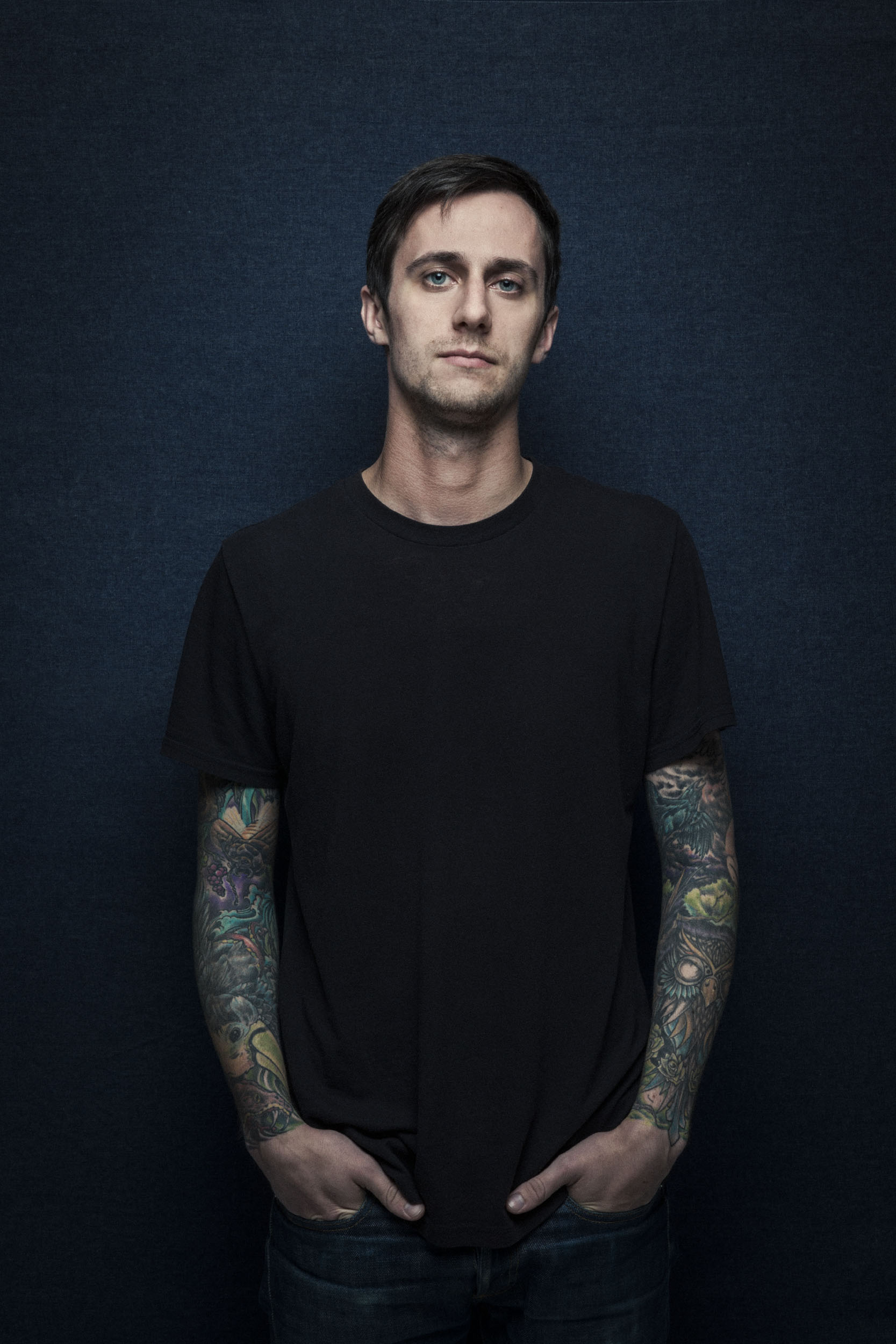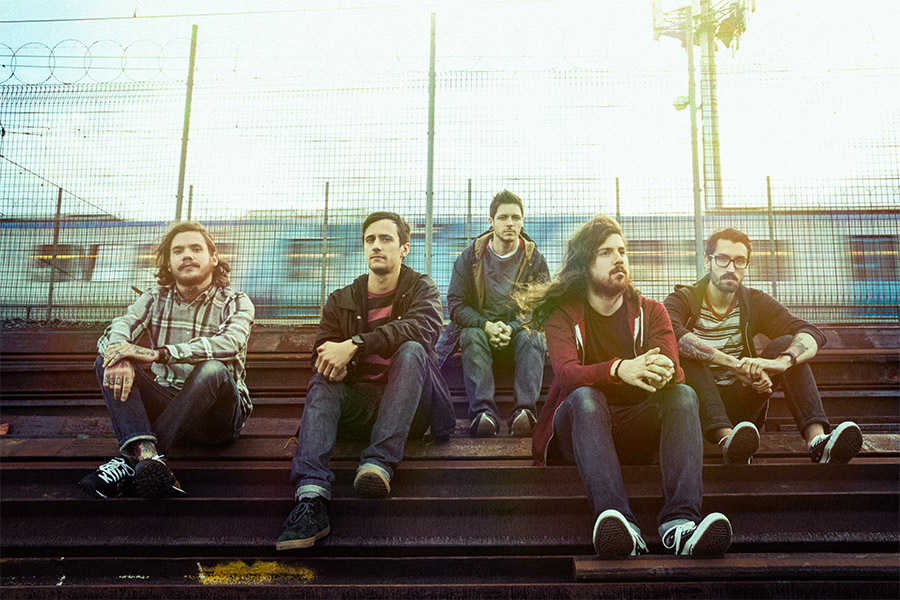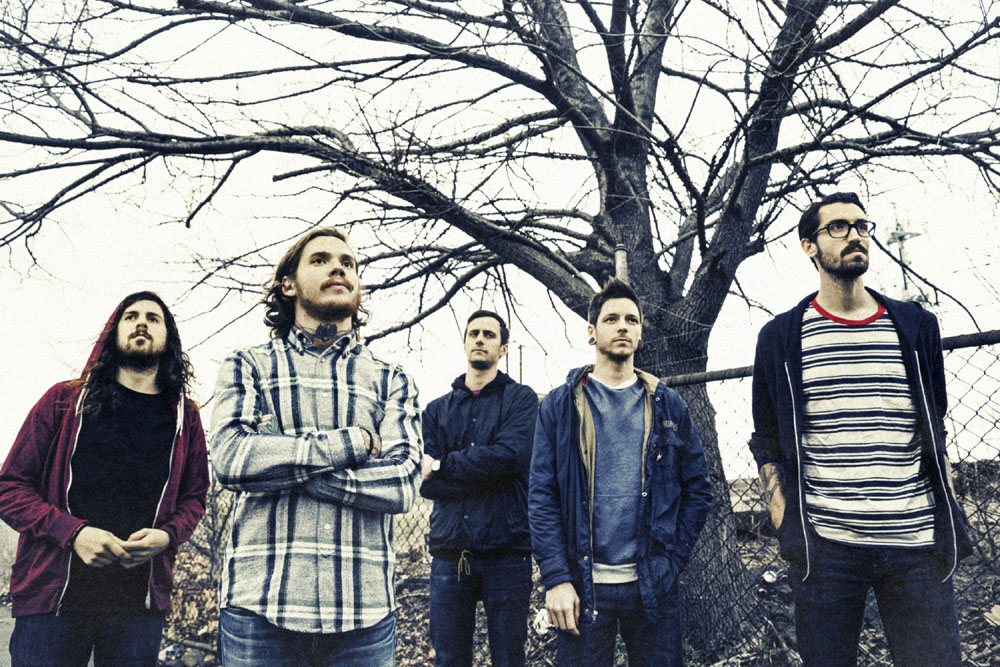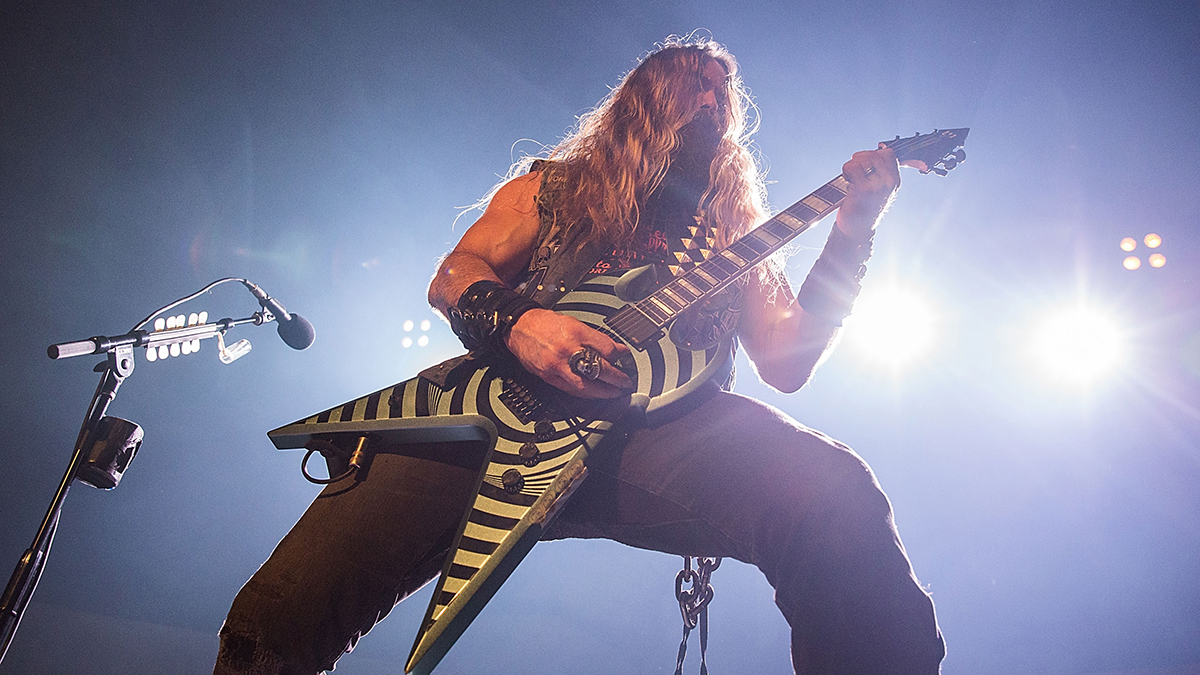The Devil Wears Prada Guitarist Chris Rubey and Executive Producer Adam Dutkiewicz Talk New Album, '8:18'
All the latest guitar news, interviews, lessons, reviews, deals and more, direct to your inbox!
You are now subscribed
Your newsletter sign-up was successful
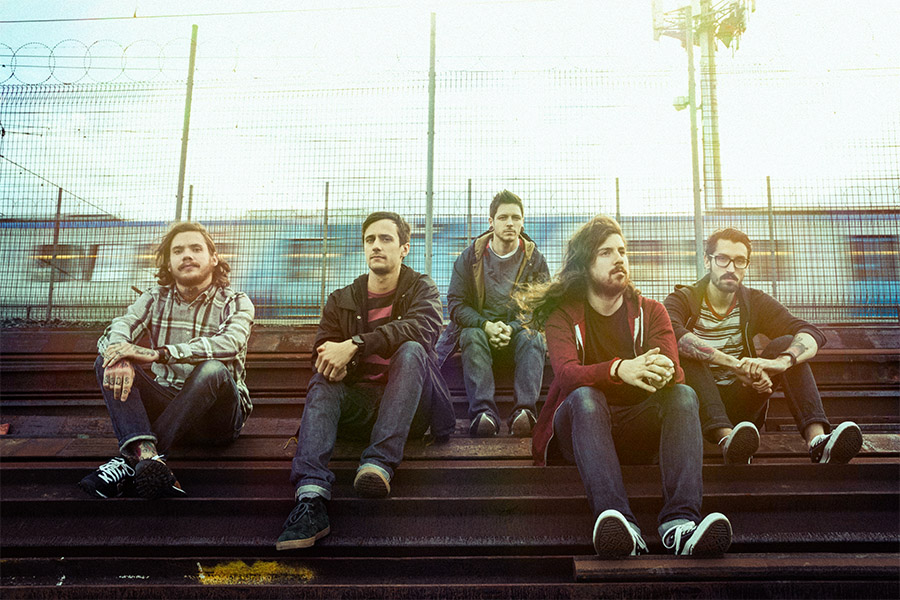
Teaming up for a second time with executive producer Adam Dutkiewicz (Killswitch Engage) and producer Matt Goldman (Underoath), the Devil Wears Prada have created an album that transcends anything they’ve done before.
8:18, the band's fifth studio release, is an atmospheric album of extreme highs and lows. With its eerie interludes, dissonant guitars and stuttering synth effects, you’d be hard pressed to predict where the next track is going to take you.
Remaining true to their roots, the Devil Wears Prada offer plenty of opportunities to head bang throughout 8:18, only now you might find subtle hints of industrialized keys scattered throughout the carefully orchestrated madness.
It’s evident the Devil Wears Prada weren't afraid to step outside of their comfort zone on certain tracks and explore new territory.
We recently had the opportunity to speak with the band’s guitarist, Chris Rubey — and Dutkiewicz — about what went into creating 8:18, the importance of pre-production and incorporating depth within an album.
GUITAR WORLD: How has the response to 8:18 been now that everyone has had a chance to digest it?
CHRIS RUBEY: We just started the Take Action Tour and we’ve played two shows, Ventura then Pomona, and we’re in Tucson now. We just did an Asian tour. I don’t know if they even have 8:18 yet; it’s different in different places. The response has definitely been best here in the U.S. Last night we played the Glass House at Pomona, and it was super-awesome. For the first time, I felt like people knew the new songs and it seems people are pretty stoked on it.
All the latest guitar news, interviews, lessons, reviews, deals and more, direct to your inbox!
Were there certain things you took from your last album, Dead Throne, that you wanted to avoid or incorporate onto 8:18?
RUBEY: There wasn’t anything wrong with Dead Throne. I really liked the songs and the way it came out, but I feel the songs needed more of their own identity; for each song to paint a different picture. On 8:18 everyone was more involved with vocals as far as "I don’t like this" or "You should do this here." I would say 8:18 is even more "us" as a band and our taste than Dead Throne.
Another big thing with 8:18 is this is our first record with our current keyboardist, John Gering, who’s pretty much in the band by now. It was cool working with him on the album, because he’s kind of like an electronic genius.
Adam, what responsibilities did you take on as producer of the album?
ADAM DUTKIEWICZ: They already had a producer, but they liked how we worked together last time so they brought me on as executive producer. I wanted to make sure I kept the producer of the record in charge and in constant contact with any decision making, and I was kind of overseeing the songwriting. When they came up with song ideas, they would send them to me and I would critique them, and maybe even restructure. Basically help bring them to their fullest potential.
Did you come into this album with a different approach than the first time you worked with them on Dead Throne?
ADAM D: Not necessarily. I don’t really approach different production jobs very differently. It’s pretty basic; you want to just look into the band and bring out their strengths and bury their weaknesses. You got to talk to them, ask them what kind of direction they want to go in and make the record the best it can be.
Was there a sense of responsibility to stick to the band's traditional sound without sounding stale?
RUBEY: Yeah. I think about who my favorite bands were. For example, I feel like Underoath kind of got a lot of hate that they didn’t sound the same anymore. Some of my favorite bands changed how they sounded when I was growing up, when I wish they hadn’t. I want to still sound the same so fans don’t feel screwed over by the band, because bands do do that. I would say just staying in the same ballpark but improving every time.
ADAM D: You don’t want to make a band lose its personality. It’s a band that’s kind of going down a certain road and they feel like that’s the right direction for them, who are you to stop them, because it’s the band's vision. I think every band has the elements of who they are and what that they do. If they want to change it up, that’s cool, if not and they want to keep chugging along with their traditional sound, that’s cool too.
Did they veer off from their traditional sound for 8:18?
ADAM D: Yeah, I liked how they’re bringing more dynamics to what they’re doing now. It’s not just straight-up "mosh mosh mosh" all the time. I like how they’re bringing moments to the record, big sonic landscapes, things that get away from being heavy all the time. It kind of makes a record more of a record when there are ups and downs.
Chris, you worked with Adam on Dead Throne. What brought you guys together then, and was it an obvious decision to bring him back for 8:18?
RUBEY: We had looked at his discography; we already knew that he had recorded a lot of really influential metal and metalcore albums. If you look at your favorite records, he’s probably worked on many of them. Plus we got a Killswitch tour, which facilitated it. He would watch us on side stage and it kind of worked itself out.
I think the vocalists really liked having him at the helm for all that, just because recording vocals was such a delicate process, I suppose, with having to coax good takes out of them, so they just were pretty adamant that Adam be involved again for 8:18.
What did he do to coax the best takes out of the vocalists?
RUBEY: He knows when to push you in a serious way, like, “Come on, you can do better, do it again.” He also knows when you’re reaching you're breaking point and don’t want to be badgered or anything like that. His sense of humor can be very abrasive if you’re in a bad mood. He just has an over-the-top personality, he knows when to be funny and when to be serious. He throws out good suggestions; it’s all about feeling comfortable.
How do you go about offering criticism without hurting their confidence. Is that something you think about?
ADAM D: That’s something you have to establish before you get into working with a band. You want them to make sure they don’t take it personally if you have something to say. When I’m working with a band, I definitely let them know it’s just my opinion and when I’m making a record I never say it’s my way or the highway. I think it’s ridiculous for a producer to think that their ideas are, for lack of another term, better, because ultimately it’s the band’s decision.
The bands are the ones making music and they need to make sure they stand up for the songs they write and the sound that they’re going for, because end of the day they’re the ones that are going to be ultimately happy with the product. They’re the ones playing it every night of the week on tour. It’s an important thing to let the band do their thing. You want to help them out but not step on their toes.
How is it receiving criticism? Can it be hard to let go of certain parts you’ve written?
RUBEY: It depends on who the criticism is coming from. If it’s producers or other band mates, I’ve had to learn to just let go of what I think, because at the point they’re hearing the songs or giving their criticisms, I’ve listened to the song so many times that I’m too close to them to realize what’s good and what’s not.
I kind of stopped speaking up for certain parts if other people wanted them out. If somebody has criticism to say of a part, I just kind of step back and let them do their thing because they probably know what they’re talking about, otherwise we wouldn’t bring in producers.
On the other hand, yes it is hard [to let go] because sometimes entire sections of songs will get cut out, that I spent a long time working on that I really liked. The hardest part for me is, I’ll write a song and someone doesn’t see the song the same way that I do. I might see this as the chorus, but they’re listening to it as the verse. It’s just weird how people hear things differently, but as hard as it may be I just kind of let other people win when it comes to editing parts out.
Were there any parts that almost didn’t make it, that you did stand up for?
RUBEY: Yeah, specifically in the opening track “Gloom,” there’s a part right in the middle of the song where the guitars cut out and it’s like this calm fill in a weird time signature and there’s this heavy part right after that, that was a hot subject of much debate. There was a bunch of different versions that we had and the way that it is on the record is the one I was pulling for the whole time.
Was most of the record preplanned or did any writing take place in the studio?
ADAM D: Musically, most of it was preplanned, they sent me demos beforehand and they were ready to go. You can’t put enough emphasis on the importance of having a good pre-production so everybody can get on the same page, the producer can hear the songs and everybody in the actual band can get an understanding of what all the parts sound like together; because when you’re always playing together you’re not really paying attention to the big picture because the truth is, you’re working on your part.
It’s a great thing to have, planning out the songs, record them before you get into the studio so you can have a plan of attack and how you want these things to be recorded.
On the track “Home for Grave” I understand you cut out quite a few parts. What influences a decision like that?
ADAM D: I definitely have a pretty heavy "cut the fat" approach when it comes to a song that feels like it may have too many similar moments. I think the listener needs to be entertained or brought on kind of a journey. When you have a song where it sounds like a bunch of parts are very similar and straight together, I think that can give the illusion that you’re just chilling or kind of caught in this one moment where the listener can’t really be taken somewhere new or cool.
That song in particular I think they just had too many parts that kind of meandered and were very similar to each other so they never really felt resolved or brought you to a specific moment where you’re like, that’s a cool structure of a song.
Did you find yourself trimming the fat off many songs on 8:18?
ADAM D: There were several songs on the record. I think when you’re writing a record it’s easy to get lost and write similar sounding things over and over again, because when you’re caught in that moment of that sound when making a record, it can be easy to kind of get lost. You just spit out so many parts you might lose grasp on making parts of songs that are for the greater good, instead of, "Oh, I like this part it needs to be in this song no matter what," instead of thinking it could be a more effective song without a random part that was brought in.
To change direction a little bit, Chris you have a remix to “Sailors Prayer” out there, can you tell me about that?
RUBEY: When you put a CD out in Japan, apparently they won’t accept it unless you have bonus tracks, so we needed bonus tracks. Our keyboard player did one and I did one, I had never even made an electronic song before. We had just gotten a bunch of new software, we had Native Instruments Complete, and it had a bunch of audio goodies so I wanted to give it a shot. I wanted to make what I considered to be one of the poppier songs that we have on the record into more of a darker version. John did a poppy happy remix and I just wanted to change the structure of the song, make it weird.
That was my first stab at an electronic song, the funny thing is the version that made it to the record is not even the final version. I sent one in and then realized it was the wrong file, but the one that got printed isn’t the final one. There’s an even better version out there and no one will ever hear it.
Who handled most of the electronic parts on the record, was it all John?
RUBEY: The original idea was to do it without anybody. We were just going to do it ourselves because Jeremy [DePoyster], our other guitar player, is pretty keyboard savvy. In the past a lot of what you’d hear on the record was a producer anyway, so we didn’t really think about it, until we realized we would rather have a real person playing the keys on stage rather than just an iPod or whatever.
So that’s when we started the hunt for a live keyboard player. John is actually our drum techs little brother so that’s how we met him. I just saw him sitting on there on his computer doing remix stuff, so I knew that he did that kind of thing. Then he toured with us for a couple tours and we decided to have John write the record with us too. It just kind of came about organically. He’s really good at what he does, he’s into the whole dance music thing. I just wanted to find someone who was really good with computers and there he was just sitting there, making songs, it was fate.
John wrote most of “Care More.” He brought it to us and said, “Here’s my song for the record.” We thought it was awesome and just added vocals.
Looking at songs like “Gloom” and “Martyrs” in comparison to tracks like “War” and “8:18,” was it a challenge to produce and write songs with such radically different approaches?
RUBEY: What’s weird is normally the heavier ones I write on the computer by myself and the jammy ones like “War” and “8:18,” those are generally what we come up with in a room together. But “Gloom” and “Martyrs” are the two heavy tracks that we wrote in a room together, so it’s coincidental that you’d mention those. It’s more of just like, every song starts with a riff and they just kind of go in that direction.
What is more difficult is making the songs flow on the album, because I don’t think it sounds great to just smash a super contrasty song next to another one, unless that’s what you’re going for. We’re aware that we want to write some ambient softer songs and we want to write some super heavy ones, we just decide what we’re going for before we start writing each one.
ADAM D: No not at all, you always approach a song as an individual thing; it’s not just the whole record. Taking one song at a time, this can make certain songs pop and be different than others. I think that’s what can really make a record special, when you have ups and downs and things changing here and there, when everything doesn’t sound the exact same.
What gear did you use on the album?
RUBEY: I play my Ibanez. I just have an RG, which I use for the drop-B songs. Then I have two customs. One is like a Les Paul looking model, which is the ARZ, and the other guys play the MG’s. As far as amps go, it got re-amped so many times I couldn’t even tell you what we used on the record. We pretty much tracked everything with Adam’s EVH 5150 and then got sent back the files from the dude mixing it, he said something about mixing it with an SLO 100 and a JCM 800 layered on top of each other, so that’d be my best guess.
Adam, what is different about producing records for other bands in relation to when you produce a Killswitch record?
ADAM D: To be honest with you, it’s the exact same. One thing I’ve tried to do with the songs I write for Killswitch, I try to never really marry myself to any of the things I write or create, to really make it almost like a democracy. You have everybody in the band make creative influences and ideas, just because I think it’s great when people put their heads together. It’s so easy for a songwriter to lose their grasp on what makes a song feel better or effective when you get caught writing tons and tons of parts every day. Having outside opinions is very very important.
- That being said, I am a songwriter for Killswitch, but when I produce, I think like I’m not a songwriter. It’s an important thing to do when you’re making stuff for your own band; you always have to be open for creative input, but not like when you’re producing.
- Is it a challenge to decide on the best take when tracking vocals? Was there much of a process to decide the cutoff of what makes it onto the record and what doesn’t?
RUBEY: Normally I don’t have a say in that. That’s Adam. I think that’s because Mike [Hranica] trusts Adam’s opinion. I think that a lot of times Mike will like it, want to keep it and then it never gets a second thought. He knows what he’s going for and if he gets it and it sounds good then we leave it. There have been a couple arguments in the studio. Someone might say, “I don’t like this scream it sounds weird,” and he’ll say, “Well, that’s the way I want it to sound,” and where can you really go from there? So normally it’s up to Mike and Adam for the vocals.
ADAM D: I think it’s pretty easy. You can kind of say something isn’t perfectly on time or the deliverance isn’t in the cleanest fashion, but I think a good take is just basically when somebody puts their heart and soul into something and it sounds like there is personality and character behind it. When you can tell they’ve been going for it, and that’s what makes it a good take.
The Devil Wears Prada are wrapping up their 2014 Take Action Tour and will be on Warped Tour this summer. Visit tdwpband.com for more information. Killswitch Engage will be heading out on a headline tour this spring. Head here for more info.
